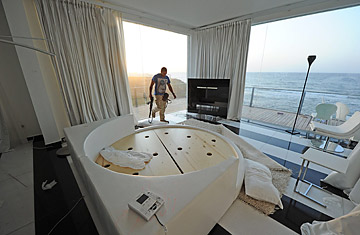
A Libyan rebel fighter walks inside the house of Saif al-Islam, son of Libyan fugitive leader Muammar Gaddafi, in Tripoli, Libya, on August 28, 2011.
No one seems particularly sure of where the tigers are. Or the lions, or the gazelles, or any of a long list of animals that the rebels say Saif al-Islam Gaddafi reportedly had in his personal zoo. But the cages are there: big, grassy, outdoor enclosures with rocky outcroppings to climb on, and very high walls. The doors are wide open.
"The animals were moved," says one rebel, uncertainly. Another claims they're residing in different cages, in another part of the sprawling and tightly secured, farm on Tripoli's outskirts. There are two peacocks wandering around leisurely and unharmed, which suggests that the big cats might be long gone. Unless, of course, there used to be more peacocks.
The farm belonged to Col. Muammar Gaddafi's heir apparent and is one of a growing number of Gaddafi family properties in and around Tripoli that the "Free Libyans" have broken into to explore in recent days, since rebel fighters took control of the capital last week. Some contain bizarre furniture — like golden mermaid couch in the opulent home of Gaddafi's daughter Aisha. His son Saadi kept a set of cages that may have been reserved for misbehaving friends, rather than wildlife. And another son, Mutassim, kept his underground bathrooms outfitted with modernist metal bidets. Ouch.
But unlike the homes of his father and siblings, Saif's farm seems to hold more treasures — and hints of excess — outdoors than it does within. That's because the Moroccan-inspired mansion — which had been equipped with a Moroccan chef — was smashed to pieces by a NATO air strike last Thursday. The missile failed to kill a single Gaddafi, instead collapsing Saif's mansion on two men and a child who had come to visit after hearing the place was abandoned. "The chef here left last Monday, so why was NATO bombing it?" asked Hassan Mohamed al-Ghebli, who had arrived with a team of volunteers and a bulldozer to remove the bodies, one of whom was his brother, a neighbor of the Moroccan chef.
Another house on the property has been thoroughly looted. Furniture too heavy to be carried away has been smashed. Rebels in gun trucks bump enthusiastically over the roads that wind through acres of grape vines and fruit orchards, vegetable and corn plots, eager to find more secrets. The farm covers a predictable subterranean network of tunnels and bunkers, the kind of thing that almost every Gaddafi lair was equipped with.
But the part that seems to have eluded even NATO are the bunkers: outside, above ground, and packed with the materials of war. There are at least 10 semi-cylindrical warehouses set covertly in the grassy hills on a corner of Saif al-Islam's property. And their contents make it clear that when Saif promised in February that the Gaddafi regime would "fight until the last man, the last woman, the last bullet" he was very much supplied to do so.
The bunkers are stocked with thousands of new military uniforms, sleeping bags, flak vests, and gas masks — enough to outfit a brigade. Air strikes have torn through some of the bunkers, scattering fatigue outfits and shredding the metal roofs, each of which had been carefully camouflaged by dirt and flora to look like a natural hill.
But there are also bunkers full of untouched ammunition and Kalashnikov rifle clips, with bullets in every size, an armored personnel carrier, and generators for the troops. And in a ditch — out in the open air, but still live and ready to use — are the bombs.
Hundreds are marked M120: an Israeli-made mortar system used by the armed forces of Libya's neighbor, Egypt. There are boxes of rockets that were shipped to Tripoli from Ramenskove, a town southeast of Moscow. And there are rocket launcher systems, explosives, and empty boxes marked for large caliber bullets.
Of course the only thing missing from the war arsenal is the eccentric owner, now on the run. Maybe the pet tigers should have been a warning. But the man who the West once thought would bring development and modernity — and international respectability — to Libya, is the one Libyans now fear could help lead an insurgency in the wake of the apparent fall of his clan — if he isn't caught.
Ali Tarhoni, who serves as the Finance and Oil Minister on the rebel's National Transitional Council, told reporters on Tuesday that the NTC knows where Col. Gaddafi is hiding, and that capture is imminent. He didn't give specifics. The NTC may very well have the family's hideout pinpointed. But that boast may be as certain as the rebels' conviction that Saif's missing tigers are... somewhere. Either way, Gaddafi and his heir apparent are still missing. But the bombs on the farm leave little doubt of what they were capable of doing.
